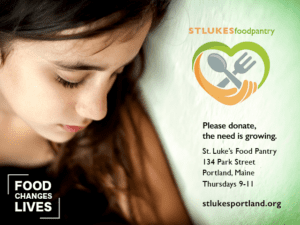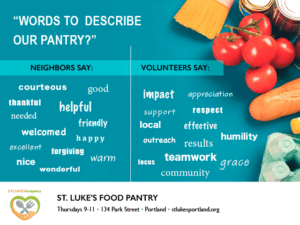February is Food Pantry Month
 February is St. Luke’s Food Pantry month! The Food Pantry was established by Chuck Sawyer 30 years ago and has been an integral part of the Cathedral’s mission to serve our neighbors ever since. Operating under the portico, it is a low-barrier food pantry visited by families to procure fresh milk and eggs, meat, produce, and shelf-stable food. There is no income eligibility requirement and families may visit and take as much food as they need as long as the supply lasts.
February is St. Luke’s Food Pantry month! The Food Pantry was established by Chuck Sawyer 30 years ago and has been an integral part of the Cathedral’s mission to serve our neighbors ever since. Operating under the portico, it is a low-barrier food pantry visited by families to procure fresh milk and eggs, meat, produce, and shelf-stable food. There is no income eligibility requirement and families may visit and take as much food as they need as long as the supply lasts.
The Pantry supplies food and builds community among the volunteers and our neighbors. Working closely together, volunteers recognize and meet the unique needs of individuals. As they wait together, neighbors form relationships and help each other and the church volunteers. Almost as important as feeding the hungry is building community.
The number of visits to the Food Pantry has increased significantly during 2021, due to both the economic hardships of Covid-19 and the documented increase of the number of immigrants and asylum seekers. Our pantry is unique in that most neighbors walk or take public transportation. The highest percentage of visitors live on the peninsula, and many have been given portable carts to wheel home their groceries. About seven out of ten households are led by individuals born outside of the U.S. and many have difficulty communicating in English. 37 households list a
shelter as their residence.
 Donations of food and money from individuals supplement food received from the USDA, Good Shepherd Food Bank, and Wayside Food Programs. The pantry also receives an allocation from the Cathedral’s operating budget.
Donations of food and money from individuals supplement food received from the USDA, Good Shepherd Food Bank, and Wayside Food Programs. The pantry also receives an allocation from the Cathedral’s operating budget.
Help is needed! How can you help? St. Luke’s Food Pantry is entirely volunteer-run by parishioners with some neighbor help. Volunteers are needed on Wednesday mornings to shop, receive deliveries of food, and prepare for Thursday’s distribution. Thursday morning volunteers set up, distribute food, and clean up. Some volunteers come weekly and others one or two days a month. Or, if you prefer to work from home, there are weekly administrative duties (ordering food, scheduling volunteers, maintaining client and donor logs) to perform. There are also as-needed administrative tasks (maintaining financial records, paying bills, liaisons with other Outreach groups, communication, fund-raising, etc.).
